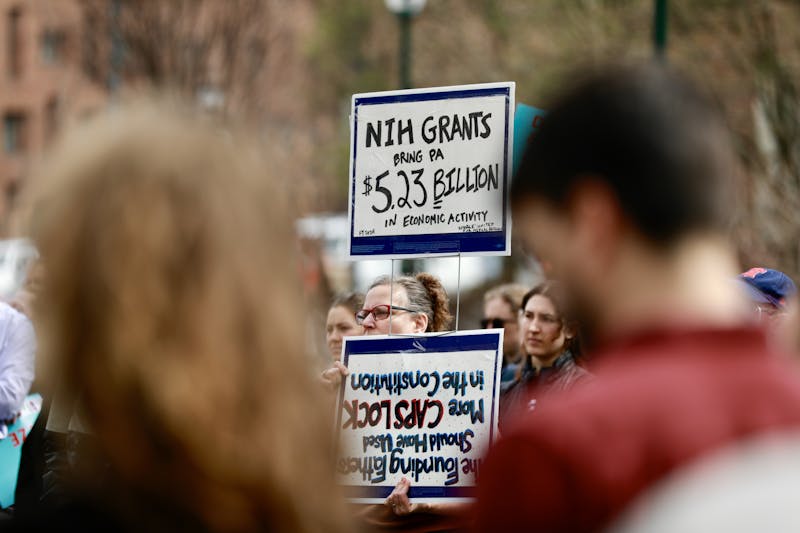State Sen. Anthony Williams will make more than $90,000 next year. A pretty good take considering the per-capita income in the district he represents -- West Philadelphia, including Penn's campus -- is $26,369. But that's what you get for being the ranking Democrat on the Senate State Government committee, which passed a whopping pay increase that will take effect Monday.
Williams voted for the bill, as did Democratic Representative James Roebuck, whose district includes Penn as well. A 20-year veteran of the state legislature could see as much as $90,000 also, a 29 percent increase from the current $69,647.
Legislators from Philadelphia to Erie will all be getting a fatter paycheck soon thanks to HB1521, which recently got Gov. Rendell's seal of approval.
Pennsylvania does not boast the nation's best-funded school system, largest network of hospitals or most growth-friendly tax environment. But it sure does have the largest and most expensive legislature. It now costs taxpayers in the commonwealth $462 million to run the legislative branch annually. That's more than California, New York, Florida and Texas, all of which are more populous.
All 253 members of the Pennsylvania legislature will get a raise of at least 16 percent. That's the low end. House Speaker John Perzel (R-Phila.) voted to give himself a 36 percent raise to $145,553.
This time it is not just tax-and-spend Democrats who are responsible for fattening their wallets. State Republicans more or less played the role of Keystone cops on recent spending measures. In the house, 50 Republicans and 29 Democrats had the common sense to say no to the outrageous salary boost. But 119 of their colleagues, including 58 Republicans, thought earning more than double the state average was fair. Memo to the Harrisburg GOP: our party used to stand for smaller government.
In no other job in America can employees dictate to their employers a 16 percent raise. In Pennsylvania, it's now the law of the land. And in Pennsylvania, many of those employers, ahem taxpayers, are mighty peeved.
Not only did lawmakers say they were getting a raise, they said they were getting it right now. The checks will be handed out on Monday. This is all thanks to a maneuver called "unvouchered expense" which circumvents a provision in the state constitution that prevents legislators from raising their own pay before an election can take place.
Sound familiar? We have the same thing in the U.S. Constitution -- it's called the 27th Amendment. Oddly enough, of the 41 states that ratified the amendment finally in 1992, Pennsylvania was not on the list.
Now you can see why.
Lawmakers in Harrisburg should get some credit, though, for working to rethink their pay structure. The new system eliminates the politically unpopular need to raise pay by linking the base salary to that of their counterparts at the federal level along with an inflation-based cost-of-living adjustment. Basically everyone gets half of what Chaka Fattah makes each year.
On principle this idea makes sense. But half? That's just ridiculous.
Legislators in Nevada make $7,800 and are only paid for half of the 120-day session (they are currently seeking voter approval for compensation for the entire session).
Texas' 181 lawmakers earn $7,200, but only meet every two years.
At home, my representative, Republican Dee Brown, earns $76.80 each day the Montana legislature is in session -- that's 90 days every other year. The Senate president and house speaker get a bonus: an extra $5 a day.
In Nebraska's unicameral legislature, the 49 senators (just 49) make $12,000 and must put any increase (even a cost-of-living adjustment) on the ballot. Voters in the Cornhusker state will vote this fall on whether to award legislators their first raise since 1988, to $21,000. The motto at the state house in Lincoln is "the salvation in the state is watchfulness in the citizen." Hopefully the same will hold true for voters here come election season.
In nearly every western state, lawmakers' earnings are much more reflective of what the average resident takes home. Not in Pennsylvania.
One person who will benefit greatly from the raise is Ralph Cappy, chief justice of the Pennsylvania Supreme Court, who seems to overlook the blatant constitutional violation going on here. He sent me a letter a few days ago to justify the raise, writing that it was "not only necessary, it was reasonable and responsible." Cappy's defense was essentially that the increase would provide "adequate" salaries "imperative in attracting and retaining the highly qualified, truly dedicated public servants who make our democracy work."
Give me a break. Even the title "public servants" seems much less relevant for a group making more than twice as much as the people they serve.
Some lawmakers have refused to accept the additional money, and others have pledged to give it to charity or other organizations to do work in their districts. That is highly laudable, considering many of them voted no in the first place. Nevertheless, a number of pols are proud of their new raise.
House Democratic Whip Mike Veon of Beaver Falls made $35,000 20 years ago. Now he'll make $124,000, a 32 percent jump from last year. And he is not bashful about it at all -- he co-sponsored the bill. This week he told the Pittsburgh Post-Gazette "I think the [higher] salary is commensurate with the job and the responsibilities that come with it. If we hadn't voted for increases over the years, we'd still be making $35,000."
Funny, because the average worker in Pennsylvania last year made $35,250.
Jeff Shafer is a junior marketing and management concentrator from Columbia Falls, Mont., and Editorial Page Editor of The Daily Pennsylvanian. Par for the Course appears on alternate Thursdays.
The Daily Pennsylvanian is an independent, student-run newspaper. Please consider making a donation to support the coverage that shapes the University. Your generosity ensures a future of strong journalism at Penn.
DonatePlease note All comments are eligible for publication in The Daily Pennsylvanian.







